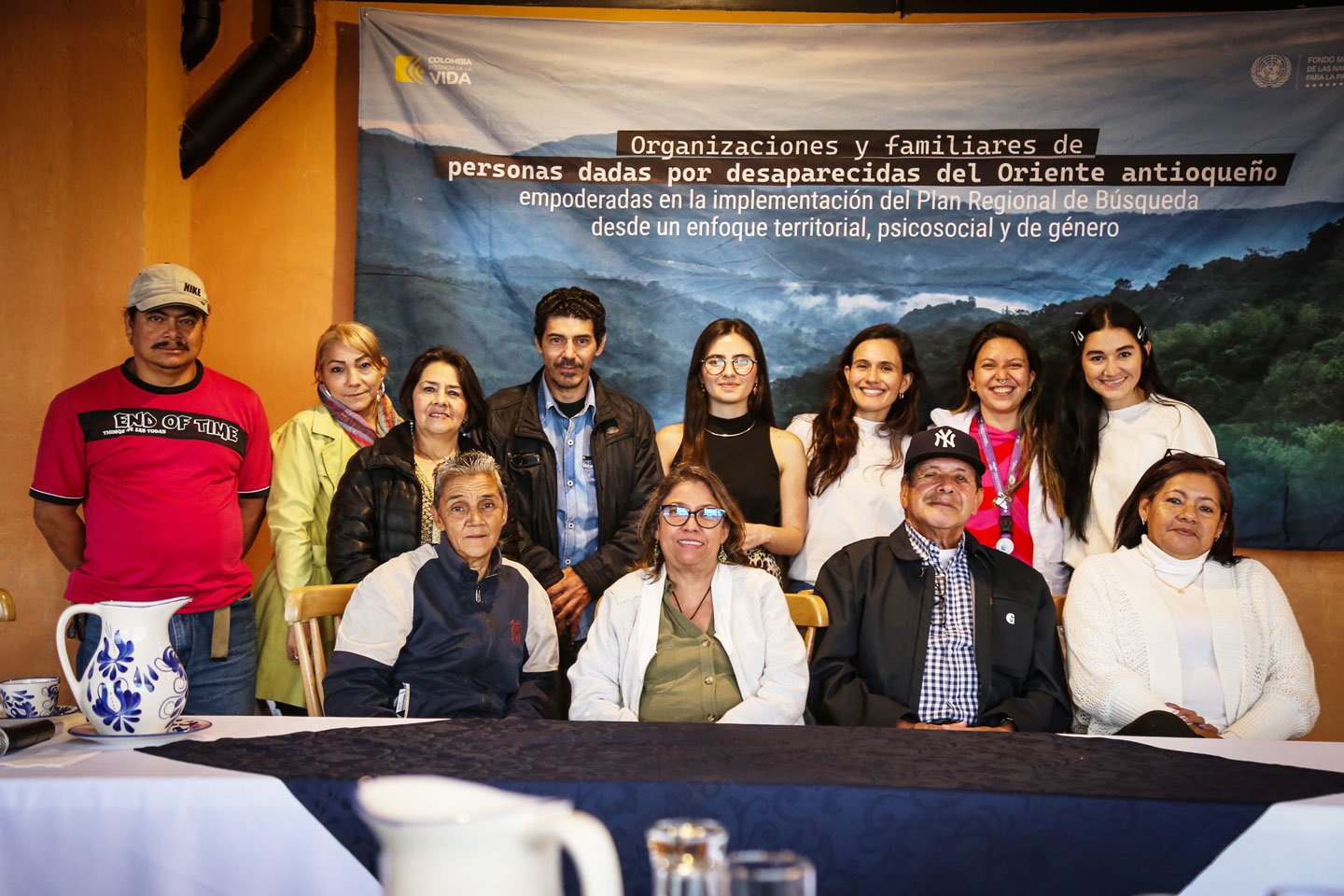VICTIMS AND TRANSITIONAL JUSTICE THEMATIC AREA
In this thematic area, victims are recognised as being at the heart of interventions, in line with the 2016 Agreement. To this end, strategies are promoted to ensure their recognition and dignity, as well as the fulfilment of their rights. This reflects the commitment to support and assist the State in its strategy for the comprehensive reparation of victims – including women – through a differential and gender-based approach that enables their access to truth, justice, reparation, and guarantees of non-repetition.
Specifically, the Fund supports two strategic lines in this thematic area:
- Strengthening the institutional framework of the Comprehensive System for Peace to ensure comprehensive, non-revictimising care, providing timely responses and removing barriers to access for female victims to truth, justice, comprehensive reparation, and guarantees of non-repetition concerning the gender-based violence they have suffered. Among the prioritised strategies is the promotion of officials activating the mechanisms created to prevent risks, protect their integrity, expedite response times to their comprehensive reparation claims, and guarantee that they do not have to endure the events that victimised them once again.
- Contributing with affirmative actions that promote the empowerment of female victims through the generation and promotion of strategies that strengthen their knowledge of their rights and access to comprehensive truth, justice and reparation mechanisms.
Celeni:Celeni: Where absence lives, resistance blooms
Celeni grew up in La Esperanza, a rural settlement in El Carmen de Viboral which, despite its name and its ceramic tradition recognised as Intangible Cultural Heritage, carries a deep history of pain and disappearance. There, amidst the mountains of Antioquia, violence broke out more than 29 years ago and never left. Between June and December 1996, the army and the Magdalena Medio Rural Self-Defence Forces disappeared 12 people, among them Celeni,
father and uncle, as well as three children who never returned home.
Since then, her mother, who became a tireless searcher, wove each day together with the thread of persistence and dignity. Without meaning to, she became Celeni’s greatest teacher. Through her quiet yet unwavering example, she taught Celeni to demand truth and justice, and to honour her father’s memory as an act of resistance. In this way, Celeni began to build her identity between absence and love, between inherited pain and the desire to transform that wound into action.
The search became a part of her life, but so too did the longing to break the cycle of silence. That is why, from a young age, she found in reading, writing, and community memory processes a path to remembrance. Inspired by her mother and supported by her community, she has promoted intergenerational dialogue spaces that connect young people with the history of the territory, ensuring that the voices of the past are not lost and that new narratives can take root.
Alongside her mother, and with the support of a project backed by the Fund, Celeni has promoted art—so highly regarded in her birthplace—as a healing language. Through dance, movement, and bodily expression, they have managed to transform pain into creativity, conveying a powerful message to their community: the body is also memory, and inhabiting it with care also brings dignity.
This process has not only contributed to individual and collective healing, but has also built bridges between generations. Young people connected to the victims have found a space to express themselves, while adults have opened the door to new conversations about the past and the present
However, Celeni
has also understood that she has the right to dream of a life of her own. She has started to forge her own path, beyond the struggle of forced disappearance, freely and without guilt. She dreams of studying a master’s degree abroad, living in different places, spreading her message, strengthening her life project and returning in order to continue supporting memory processes in her community.
Together with her mother, she leads the Itinerant Rural Library in the village, a space for listening, reading, and reconstructing history through the voices of the territory. And although the journey has been long and painful, it has also brought progress. In 2021, after learning of the conviction of Ramón Isaza in relation to the case of La Esperanza, within the framework of the Justice and Peace process, they felt a small sense of relief and renewed strength to carry on.
“Knowing that there is a path for finding our relatives gives us the strength to continue, without forgetting the importance of caring: for oneself, for others and for the territory”, Celeni explains. She is more than the daughter and niece of three missing people. She is a voice that does not give up, a woman who transforms pain into living memory and who sows the seed of hope in lands marked by absence.

![]() The Fund recognises the strength and monumental efforts of female searchers who, like Celeni, have made it their life’s purpose to find answers about what happened to their loved ones and to obtain justice, while also seeking to reclaim their place in life beyond the pain of being victims, and to forge on by building new, resilient paths that allow them to move forward with their personal and collective dreams
The Fund recognises the strength and monumental efforts of female searchers who, like Celeni, have made it their life’s purpose to find answers about what happened to their loved ones and to obtain justice, while also seeking to reclaim their place in life beyond the pain of being victims, and to forge on by building new, resilient paths that allow them to move forward with their personal and collective dreams



